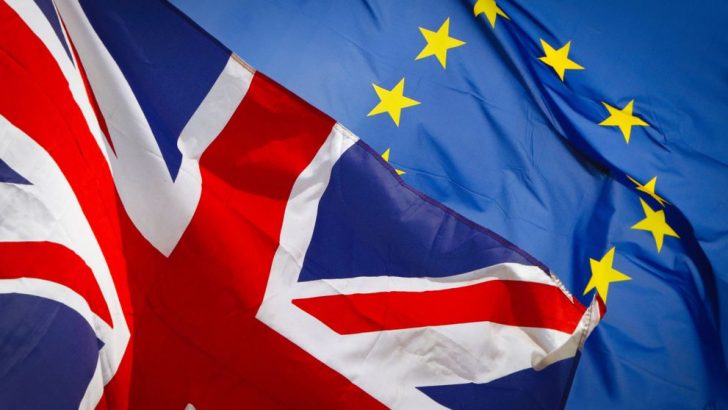“Smaller countries are aware of the difficulties that come from being isolated”, writes Martin Mansergh
There are two unusual features about the Brexit referendum on June 23 from an Irish perspective. On no previous occasion in the past 100 years have Irish residents been so positively encouraged by the British government and its emissaries to exercise an influence on their relatives and friends who have a vote there.
The hope is that they can be mobilised to vote to remain in the EU on June 23. This contrasts with the strict neutrality observed by all Irish parties in the Scottish independence referendum in 2014. This time of course Ireland has a big stake in the outcome, because it will be much affected by it, if the vote is to leave. Irish citizens living in Britain, provided they are registered, will have a vote, as will British citizens registered to vote in their own country resident in the Republic. All the people of Northern Ireland will have a say.
The second unusual feature is the overwhelming view of friendly partner countries and virtually every representative economic organisation, national and international, that Britain should remain in the EU.
A vote to leave would create a lot of political and economic uncertainty in the short term. Although presumably there would be a huge effort all round at damage limitation and to minimise the rift, not all consequences would necessarily be immediately controllable. Sterling and in all probability the economy itself would weaken, at least temporarily, to the detriment of Ireland.
Legal position
The legal position of EU (other than Irish) citizens in Britain and of British citizens on the continent would be a cause of some anxiety. There would in all probability be conflicting pressures between European countries determined to tighten the cohesion of the EU by a new treaty, on which the Republic’s electorate would have to vote, and forces on the fringes in several countries seeking to exit and break up the EU.
There are several factors being used to try and push voters in the exit direction. Easily the biggest is immigration, playing on the population congestion particularly concentrated in the south-east of England.
The tight control desired is incompatible with continued access to the EU’s single market, and would therefore come at a high economic price. While the EU grapples with the refugee crisis in a rancorous atmosphere, it is easy to rouse fears amongst the British public. A country which attracts few immigrants is a poor one. For a rich one, immigrants become essential to the functioning of the economy.
The second issue is the emotive appeal to sovereignty. England was last conquered in 1066, but most of Britain’s European partners have been invaded and occupied within living memory. Smaller countries, while proud of their sovereignty, are aware of its fragility and of the difficulties that come from being isolated.
The EU has been compared, most incongruously, with military attempts to unite the continent under Louis XIV, Napoleon and Hitler. None of them had Vatican support, least of all the last.
On the whole, more benign and lasting structures like the Holy Roman Empire (with the serious exception of the Thirty Years War) or even up to a point the Austro-Hungarian Empire tend not to be mentioned. The EU’s achievement in contributing to the end of wars and destruction of life on a vast scale is a huge one. There are still plenty of dangers ahead, and it would be foolish to think that close European cooperation is no longer needed in all forums. This does not, however, justify the ‘Remain’ camp in painting lurid scenarios of a heightened risk of war following a Brexit.
Of course, a Brexit might bring both short-term gains and losses to Ireland. Our view is more influenced by what we see as our long-term interests.
Part of the price of independence 100 years ago was to throw up barriers not only between Britain and Ireland, but more particularly between the two parts of Ireland. Joint membership of the EU, its deepening, as well as the peace process, enabled many of those barriers to be removed.
The terms of the Good Friday Agreement took absolutely for granted Britain and Ireland’s continued EU membership. There is concern that Brexit would put some of those gains in question, and set back both North-South as well as British-Irish relations. No doubt, some unionists are attracted by the idea of a deeper trench along the border, but others would be more influenced by the consideration that Northern Ireland, being more vulnerable, might be particularly badly affected by a Brexit fall-out.
All big political battles are power struggles, while ostensibly being about issues. It is very obvious that the referendum campaign is being fought out largely between rival leadership factions in the Tory party, with Labour on the side-lines. With regard to outcome, it is in the interests of many to maintain the suspense till the last minute.
Opinion polls vary and betting odds are unreliable. The currency markets in the first quarter showed sterling falling quite sharply, but it has eased up a little since. If the vote is to remain, a clear result rather than a narrow one would be desirable, so that there is no temptation to agitate for a re-run. There is likely in any event to be increased EU activity, because of projects and decisions held back for fear that they might negatively affect the Brexit referendum.
From observation, ever since what is now the EU began, the leadership of the Catholic Church in Rome has been broadly, if discreetly, supportive.
While that is broadly reflected at home, there have been Catholic-inspired groups here that are much less enthusiastic, seeing the EU as a force for secularism. One well-known activist, talking to me recently, likened Brexit to de Valera’s quest for external association with the British Commonwealth during the Treaty negotiations in 1921. If that were all that was involved, it would be a less alarming prospect.


 Dr Martin Mansergh
Dr Martin Mansergh